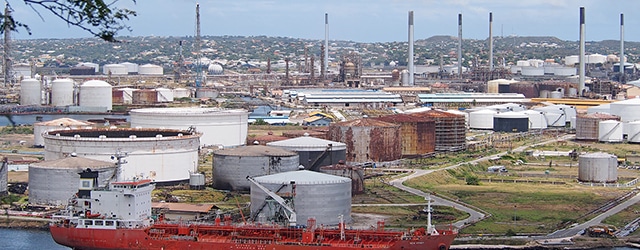Curaçao enjoys income from multiple sources but is buffeted by troubles spilling out of Venezuela.

|
CURAÇAO: VITAL STATISTICS |
|---|
|
Location: Caribbean |
|
Neighbors: Venezuela, Colombia, Aruba, Bonaire |
|
Capital city: Willemstad |
|
Population (2019): 163,694 |
|
Official languages: Dutch, Papiamentu, English |
|
GDP per capita (2017): US$19,457.50 |
|
GDP growth (2017): —1.7% |
|
Inflation (2017): 2.2% |
|
Currency: Netherlands Antillean guilder |
|
Investment promotion agency: Curaçao Investment and Export Promotion Agency |
|
Investment incentives available: Tax incentives |
|
Ease of Doing Business rank (2018): Not ranked |
|
Corruption Perceptions Index rank (2018): Not ranked |
|
Political risks: Migrants from Venezuela; government is reportedly nervous of offending the US over Venezuela |
|
Security risks: Categorized by the US State Department as “major money laundering jurisdiction.” |
|
PROS |
|---|
|
High per-capita income and well-developed infrastructure compared to other countries in the region |
|
Status as a midshore finance center |
|
Preferential access to EU and US markets |
|
CONS |
|---|
|
At time of writing, no air or sea communications with Venezuela |
|
Limited natural resources |
|
Poor soil |
|
Inadequate water supplies |
|
Risk of Zika virus |
|
Sources: 2018 Trafficking in Persons Report, Central Bureau of Statistics Curaçao, Curaçao Chronicle, Curaçao Ports Authority, International Monetary Fund, Statista, Transparency International, UK Travel Advisory, US State Department Travel Advisory, World Bank, World Population Review |
Curaçao boasts an oil industry, a sizable tourism sector and status as a corporate tax haven. Yet the island nation, an autonomous country within the Kingdom of the Netherlands, is under severe economic pressure—partially due to the political crisis and economic collapse in Venezuela, its close neighbor to the south.
Atop the list of problems: Isla Curaçao, the state-owned oil refinery, needs a new operator. The current contract with Petroleos de Venezuela runs out at the end of 2019.In December, PDVSA won a temporary extension of its contract to last up to one year while the refinery continues looking for a new operator.
While the refinery had received an exemption from US sanctions on Venezuela, production has dwindled drastically due to lack of crude from Venezuela, says Wilder Alejandro Sanchez, a Peru-based analyst who follows Curaçao.
Finding a new operator would help jumpstart Curaçao’s economy and reassure the Netherlands government of the island’s economic stability, Sanchez adds.
Curaçao already had an unemployment rate of 21.2%, now worsened by layoffs that accompanied the privatization in March of the state-owned telecom company, United Telecommunications Services, and cutbacks at the oil refinery. It is “uncertain what might happen when new operators take over [the refinery],” Sanchez says.
The Venezuelan crisis has also triggered a massive inflow of migrants to Curaçao—estimated at 15,000—a major burden on a country with a population of only 163,000. The Netherlands government has offered €24 million ($26 million) and some technical assistance in processing asylum claims to help, but Curacao must share the money with nearby Aruba.
Curaçao’s fiscal outlook is also turning critical. In July, the Netherlands’ Kingdom Council of Ministers instructed the island’s government to design a long-term budget to get in the black by 2022.
Curaçao’s 2019 deficit—not yet available—and its combined 2017 and 2018 deficit of 175.3 million guilders ($98 million) “must be compensated with surpluses in 2020, 2021 and 2022,” the council declared. It also wants the government’s debts to the General Pension Fund of Curaçao and the Social Insurance Bank cleared.
Meanwhile, net FDI inflows in 2018 dropped to $123 million from $172 million in 2017 and $133 million in 2016.
Not helping to bring those numbers up is Curaçao’s reputation as a locus for drug trafficking and human trafficking. “Human trafficking is particularly an increasing concern,” says Miguel Goede of Willemstad-based Goede Consultants.
Tourism remains a bright spot. Economic woes have not dulled Curaçao’s status as a sought-after destination. The island hosted 297 cruise calls in 2018, up from 232 in 2016. The number of cruise passengers rose to 761,000 last year, up from 633,000 in 2017 and 469,000 in 2016.



